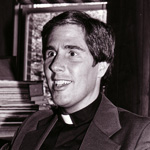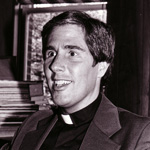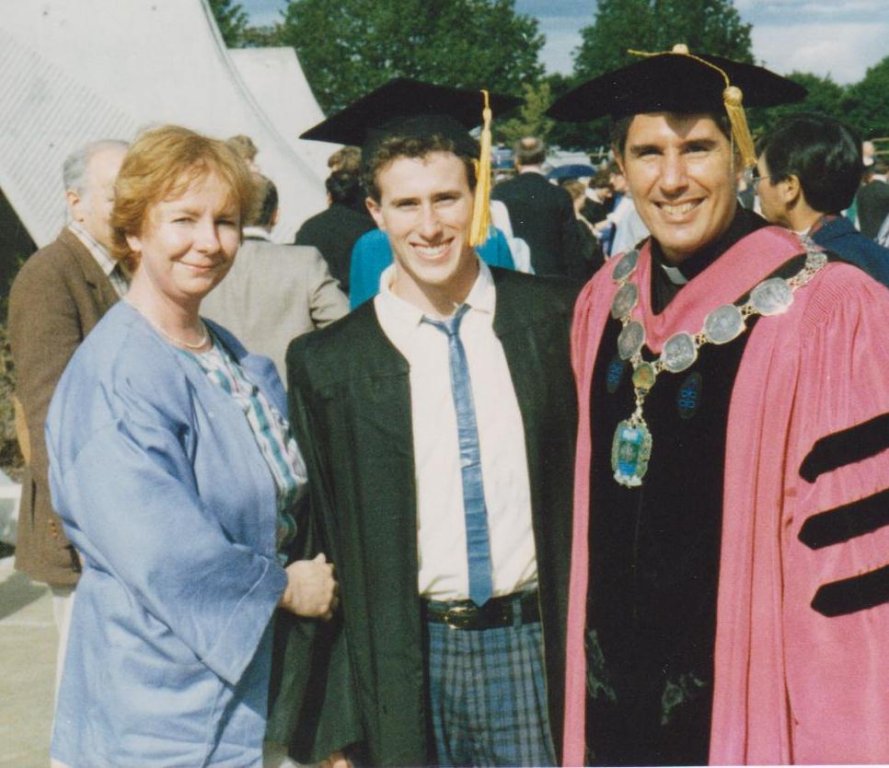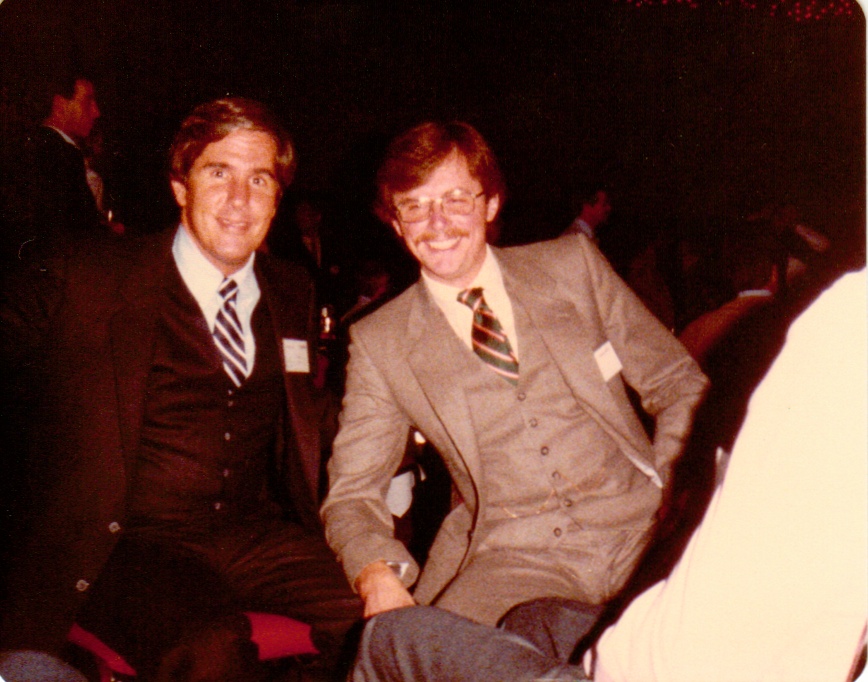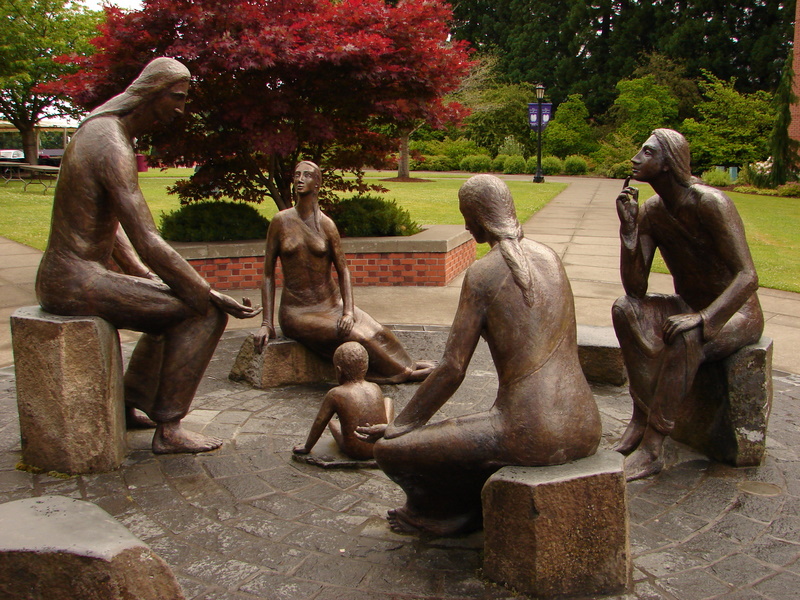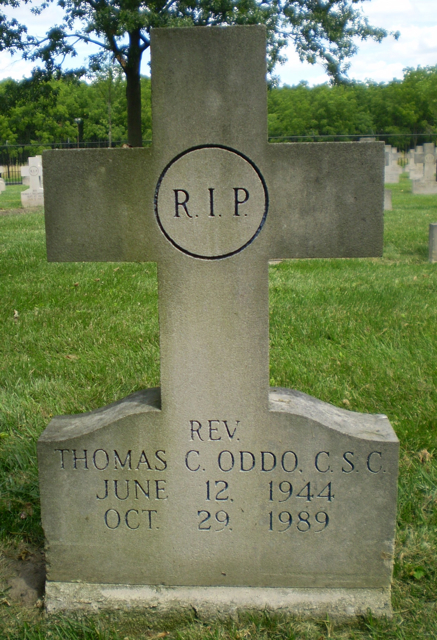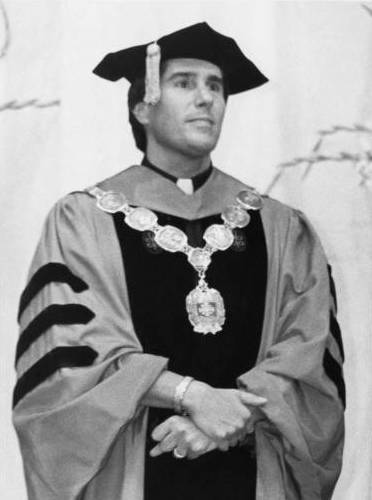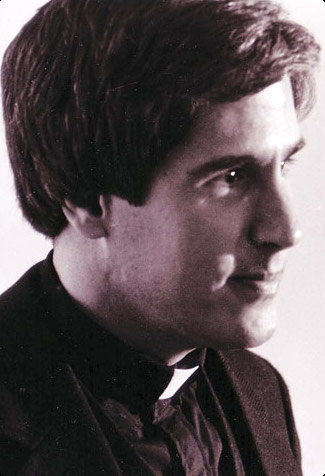Rev. Thomas Oddo CSC, president of the University of Portland and a board member and former professor and student at the University of Notre Dame was killed in a car accident. He was returning from a board of trustees meeting at Notre Dame this weekend, when a trailer swung in front of his car on the way home from the airport. He had been elected to the board of trustees in May. He was a candidate during the 1987 search for the successor to former Notre Dame President Theodore M. Hesburgh. He was a member of the Holy Cross Provincial Task Force on Higher Education and the Provincial Council.
A native of New York, he was president of the University of Portland, one of the colleges affiliated with the Holy Cross Province since 1982. He came to Portland from Stonehill College, North Easton, Mass., where he was an assistant professor of religious studies. He also served as a trustee at Stonehill College and St. Edward's University in Austin, Texas. He was ordained in the Order of Holy Cross in April 1970 at Notre Dame. Rev. Oddo graduated from Notre Dame in 1965, He holds a masters degree in theology from Notre Dame, and a doctorate in theology from Harvard University. At one time he taught theology at Notre Dame.
Prior to his service as President of the University of Portland, Tom courageously worked for the full inclusion of LGBT Catholics in the Church. He served as National Secretary (1973-1974) for DignityUSA (a national Catholic organization of and for LGBT Catholics).
Among his many other accomplishments in 1975 he co-authored "Homosexual Catholics : a primer for discussion"
______________________________________________
South Bend Tribune 10/31/1989
Services for Rev. Thomas C. Oddo CSC, 45, president of the University of Portland and a board member and former professor and student at the University of Notre Dame who was killed Sunday in an automobile accident, will be conducted Wednesday in the Chiles Center at the University of Portland. The body will be brought to South Bend for services at 3:30 p.m. Friday at Moreau Seminary with burial in the Holy Cross Community Cemetery on the Notre Dame campus. Friends may call after 3:30 p.m. Thursday in Moreau Seminary Chapel, where a wake will be held at 7:30 p.m.
______________________________________________
Thomas C. Oddo, C.S.C. Memorial Scholarship
Shortly after his untimely death in 1989, University of Portland President Father Thomas C. Oddo, C.S.C., was memorialized by faculty, staff, students, and friends with the establishment of an endowed scholarship fund named after him. Every year the University awards scholarship funds in Father Oddo's name to one or more students who meet a set of criteria which includes demonstrated commitment to service and to service learning.
______________________________________________
The following article appeared in the 2009 winter edition of the University of Portland Magazine:
The University's seventeenth president died in a car crash twenty years ago, a mere 45 years old. Literature professor Father David Sherrer, C.S.C., remembers the haunted next few days.
TOM ODDO DIED on a Sunday afternoon in late October as he was returning to campus after attending two board meetings. He had flown from Portland to Chicago to visit some consultants that were to help in the development of a capital campaign; then he traveled on to Notre Dame where he sat for the first time as a member of the governing board of his alma mater. As that meeting closed he was flown in a corporate jet belonging to the Georgia Pacific Corporation to attend meetings of that board of which he had been a member for some months. The same corporate jet returned him to the Hillsboro airport southwest of Portland, but he needed to be taken by cab to the Portland airport to pick up his car, which he had left there before his flight to Chicago. He was coming from that airport parking lot to the University along Columbia Boulevard when his car was struck by a flat-bed trailer that had become detached from the truck towing it. The trailer drifted into his lane on the roadway and struck his car head-on.
The busyness of that weekend seemed characteristic of Tom's life since becoming president of the University. He had been everywhere, accessible to everyone: students, faculty, staff, regents, alumni, and friends of the University. He was everywhere, always in touch, but in a sense always alone. His presence on campus in the days after his death seemed almost to parallel his availability in life, except, perhaps, that it was reversed: the campus community took on Tom's visibility and omnipresence.
Tom's body was returned to campus on Monday afternoon. We had planned to bring it to the chapel where it would remain available for private viewing. We had organized a small liturgical procession to go from the door of the chapel out to the main drive, past the south wing of Buckley Center and past the old science building to the point where the walk crossed the double drive. As we walked, cross-bearer, thurifer, candle bearers, presiding priest dressed in a cope, we passed between hundreds that had gathered along the walkway, silently watching us pass.
When we reached the driveway, the coffin was removed from the hearse and placed on a catafalque and added to our little procession for the walk back to the chapel. Now six pall bearers walked beside the coffin and the crowd along the sidewalk was, if anything, more dense. The great double doors of the chapel were swung open and we came in. The crowd squeezed in behind the procession.
No words or added ceremony were necessary: a sprinkling of holy water on the closed coffin only marked the return of the Christian to his home. The silence of the hundreds who tried to find a place in the chapel was adequate expression of the heartfelt prayer: have mercy on Father Tom; have mercy on us! We found a place for the coffin behind the altar, under the balcony with its row of lights. We left a couple of candles burning there as well. The instinct of the presider was to withdraw in silence and to leave the body there for the night for the hundreds who wished to look on Tom's coffin or kneel in prayer.
Eventually the silent crowds dwindled but there were always a few keeping vigil, one or two standing near the body, heads bowed, deeply and unexpectedly touched by their realization of what his life had meant to them.
A funeral service, without the celebration of the Eucharist, was planned for Tuesday afternoon in the Chiles Center, after which the body would be taken to the airport for a return to South Bend and to the Holy Cross community cemetery on Notre Dame's campus. Although this event had more the marks of a liturgy — music with hymns sung by those gathered, the reading of Sacred Scripture, prayer, and blessings for the body in its coffin—the most significant elements seemed to be created by the community that had gathered. Now a few thousand persons took their places. Those who entered could easily identify the most distinguished among those attending: Tom's grieving mother and his sister and brother-in-law, the governor of the state, the mayor, the official representatives of the Congregation of Holy Cross and of the University, its Board of Regents, its student body, its faculty and staff. All were arranged in places that let us reflect once again on Tom's reach. As we arrived, the coffin was already in its central place and around it, facing the growing congregation, stood four or six of their representatives: a physics professor, a student leader, a regent, a hall director, a priest, an athlete. From time to time others rose from the congregation to take the place of these symbolic guardians.
At last we made our way out of the Chiles Center, the closed coffin part of our procession, to find the hearse waiting to take the body to the airport whence it would return to Notre Dame for a more formal funeral on the following Friday. The crowd dispersed. We began to talk again to one another, many of us making our way back to the Chapel of Christ the Teacher for a vigil Mass for the Feast of All Saints. We were freer now to express what we had all felt. We even recognized something of the significance of the two buildings that had sheltered us and our fallen brother in the last three days: the Chiles Center and the Chapel of Christ the Teacher, on opposite sides of the campus, not academic buildings in the strict sense, but signs, nonetheless, of the direction and inspiration that Tom had given to the University, a sense of confidence, and a sense of the largeness of the future suggested by its mission.
______________________________________________
Facebook Memorial Page
Memorial Sculpture to Fr. Tom
Sculpture - Another version
In Memory: Rev. Thomas C. Oddo, CSC
Tom's Reach
Thomas Oddo Service Award
Fr. Tom Oddo speaks in San Diego
Hall of Fame Inductee
A Video narrated in part by Fr. Tom Oddo
______________________________________________
Rev. Thomas Oddo CSC, president of the University of Portland and a board member and former professor and student at the University of Notre Dame was killed in a car accident. He was returning from a board of trustees meeting at Notre Dame this weekend, when a trailer swung in front of his car on the way home from the airport. He had been elected to the board of trustees in May. He was a candidate during the 1987 search for the successor to former Notre Dame President Theodore M. Hesburgh. He was a member of the Holy Cross Provincial Task Force on Higher Education and the Provincial Council.
A native of New York, he was president of the University of Portland, one of the colleges affiliated with the Holy Cross Province since 1982. He came to Portland from Stonehill College, North Easton, Mass., where he was an assistant professor of religious studies. He also served as a trustee at Stonehill College and St. Edward's University in Austin, Texas. He was ordained in the Order of Holy Cross in April 1970 at Notre Dame. Rev. Oddo graduated from Notre Dame in 1965, He holds a masters degree in theology from Notre Dame, and a doctorate in theology from Harvard University. At one time he taught theology at Notre Dame.
Prior to his service as President of the University of Portland, Tom courageously worked for the full inclusion of LGBT Catholics in the Church. He served as National Secretary (1973-1974) for DignityUSA (a national Catholic organization of and for LGBT Catholics).
Among his many other accomplishments in 1975 he co-authored "Homosexual Catholics : a primer for discussion"
______________________________________________
South Bend Tribune 10/31/1989
Services for Rev. Thomas C. Oddo CSC, 45, president of the University of Portland and a board member and former professor and student at the University of Notre Dame who was killed Sunday in an automobile accident, will be conducted Wednesday in the Chiles Center at the University of Portland. The body will be brought to South Bend for services at 3:30 p.m. Friday at Moreau Seminary with burial in the Holy Cross Community Cemetery on the Notre Dame campus. Friends may call after 3:30 p.m. Thursday in Moreau Seminary Chapel, where a wake will be held at 7:30 p.m.
______________________________________________
Thomas C. Oddo, C.S.C. Memorial Scholarship
Shortly after his untimely death in 1989, University of Portland President Father Thomas C. Oddo, C.S.C., was memorialized by faculty, staff, students, and friends with the establishment of an endowed scholarship fund named after him. Every year the University awards scholarship funds in Father Oddo's name to one or more students who meet a set of criteria which includes demonstrated commitment to service and to service learning.
______________________________________________
The following article appeared in the 2009 winter edition of the University of Portland Magazine:
The University's seventeenth president died in a car crash twenty years ago, a mere 45 years old. Literature professor Father David Sherrer, C.S.C., remembers the haunted next few days.
TOM ODDO DIED on a Sunday afternoon in late October as he was returning to campus after attending two board meetings. He had flown from Portland to Chicago to visit some consultants that were to help in the development of a capital campaign; then he traveled on to Notre Dame where he sat for the first time as a member of the governing board of his alma mater. As that meeting closed he was flown in a corporate jet belonging to the Georgia Pacific Corporation to attend meetings of that board of which he had been a member for some months. The same corporate jet returned him to the Hillsboro airport southwest of Portland, but he needed to be taken by cab to the Portland airport to pick up his car, which he had left there before his flight to Chicago. He was coming from that airport parking lot to the University along Columbia Boulevard when his car was struck by a flat-bed trailer that had become detached from the truck towing it. The trailer drifted into his lane on the roadway and struck his car head-on.
The busyness of that weekend seemed characteristic of Tom's life since becoming president of the University. He had been everywhere, accessible to everyone: students, faculty, staff, regents, alumni, and friends of the University. He was everywhere, always in touch, but in a sense always alone. His presence on campus in the days after his death seemed almost to parallel his availability in life, except, perhaps, that it was reversed: the campus community took on Tom's visibility and omnipresence.
Tom's body was returned to campus on Monday afternoon. We had planned to bring it to the chapel where it would remain available for private viewing. We had organized a small liturgical procession to go from the door of the chapel out to the main drive, past the south wing of Buckley Center and past the old science building to the point where the walk crossed the double drive. As we walked, cross-bearer, thurifer, candle bearers, presiding priest dressed in a cope, we passed between hundreds that had gathered along the walkway, silently watching us pass.
When we reached the driveway, the coffin was removed from the hearse and placed on a catafalque and added to our little procession for the walk back to the chapel. Now six pall bearers walked beside the coffin and the crowd along the sidewalk was, if anything, more dense. The great double doors of the chapel were swung open and we came in. The crowd squeezed in behind the procession.
No words or added ceremony were necessary: a sprinkling of holy water on the closed coffin only marked the return of the Christian to his home. The silence of the hundreds who tried to find a place in the chapel was adequate expression of the heartfelt prayer: have mercy on Father Tom; have mercy on us! We found a place for the coffin behind the altar, under the balcony with its row of lights. We left a couple of candles burning there as well. The instinct of the presider was to withdraw in silence and to leave the body there for the night for the hundreds who wished to look on Tom's coffin or kneel in prayer.
Eventually the silent crowds dwindled but there were always a few keeping vigil, one or two standing near the body, heads bowed, deeply and unexpectedly touched by their realization of what his life had meant to them.
A funeral service, without the celebration of the Eucharist, was planned for Tuesday afternoon in the Chiles Center, after which the body would be taken to the airport for a return to South Bend and to the Holy Cross community cemetery on Notre Dame's campus. Although this event had more the marks of a liturgy — music with hymns sung by those gathered, the reading of Sacred Scripture, prayer, and blessings for the body in its coffin—the most significant elements seemed to be created by the community that had gathered. Now a few thousand persons took their places. Those who entered could easily identify the most distinguished among those attending: Tom's grieving mother and his sister and brother-in-law, the governor of the state, the mayor, the official representatives of the Congregation of Holy Cross and of the University, its Board of Regents, its student body, its faculty and staff. All were arranged in places that let us reflect once again on Tom's reach. As we arrived, the coffin was already in its central place and around it, facing the growing congregation, stood four or six of their representatives: a physics professor, a student leader, a regent, a hall director, a priest, an athlete. From time to time others rose from the congregation to take the place of these symbolic guardians.
At last we made our way out of the Chiles Center, the closed coffin part of our procession, to find the hearse waiting to take the body to the airport whence it would return to Notre Dame for a more formal funeral on the following Friday. The crowd dispersed. We began to talk again to one another, many of us making our way back to the Chapel of Christ the Teacher for a vigil Mass for the Feast of All Saints. We were freer now to express what we had all felt. We even recognized something of the significance of the two buildings that had sheltered us and our fallen brother in the last three days: the Chiles Center and the Chapel of Christ the Teacher, on opposite sides of the campus, not academic buildings in the strict sense, but signs, nonetheless, of the direction and inspiration that Tom had given to the University, a sense of confidence, and a sense of the largeness of the future suggested by its mission.
______________________________________________
Facebook Memorial Page
Memorial Sculpture to Fr. Tom
Sculpture - Another version
In Memory: Rev. Thomas C. Oddo, CSC
Tom's Reach
Thomas Oddo Service Award
Fr. Tom Oddo speaks in San Diego
Hall of Fame Inductee
A Video narrated in part by Fr. Tom Oddo
______________________________________________
Inscription
R.I.P.
Rev. Thomas C. Oddo, C.S.C.
